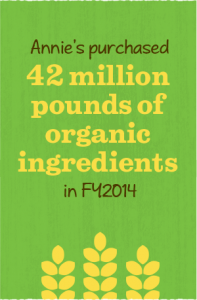The Great Granddaughter of General Mills’ Co-Founder Speaks Out

Today, at General Mills shareholder meeting, something remarkable happened. And if it doesn’t speak to the changing food landscape in the U.S., I don’t know what does.
Shareholders were set to vote on an initiative calling for the removal of genetically engineered ingredients from all General Mills’ products. Even though General Mills announced that they would be removing genetically engineered ingredients from Cheerios earlier this year, the measure did not look likely to pass.
 All eyes were on the vote, though, especially in the aftermath of the announcement that General Mills was acquiring Annie’s Homegrown.
All eyes were on the vote, though, especially in the aftermath of the announcement that General Mills was acquiring Annie’s Homegrown.
So what happened? The great granddaughter of the co-founder of General Mills spoke up.
“As a proud stockholder, I am concerned about our reputation as a company that uses genetically modified organisms,” Harriett Crosby told the annual meeting crowd.
“I think we can do better and improve our brand and the value of General Mills by eliminating GMOs from our products.”
Crosby cited one irrefutable truth about GMOs: General Mills already produces GMO-free versions of its products in Europe and parts of Asia and already labels them in 63 countries around the world.
So, Crosby asked, “Why not here?”
Why not here?
American food companies already label genetically engineered ingredients or make their products without them in Europe, Asia and 64 countries around the world. They are doing it for all of our key U.S. trading partners and the families that live in those countries, but they are hiding these ingredients from families in the United States.
More than 100 scientific and public health institutions around the world support GMO labeling to track potential allergic reactions. The United Nation and the World Health Organizations’ food standards group and the American Medical Association have called for mandatory safety testing – a standard that the U.S. currently fails to meet.
General Mills already labels these ingredients in their products that they sell overseas.
For the company to continue to take an anti-labeling position on this changing landscape of health and consumer demand, while holding the opposite position overseas, is not in the best interest of shareholders. It’s a double standard.
Anti-labeling initiatives could significantly hinder the company for years, as well as stifle the expansion of jobs and the economy in Minneapolis and the U.S., as other companies and our trading partners seize the opportunity to meet this change in consumer demand. The anti-labeling initiatives would directly impact a family’s ability to make an informed choice when it comes to feeding their loved ones. It would continue to keep American farmers in the dark, withholding from them the data and insight that labeling these ingredients would provide.
As Ms. Crosby said, General Mills is already required to produce GMO-free varieties of its products in Europe and parts of Asia….
They already label these ingredients around the world. Why not here?
Her call to action would ensure that General Mills meets the needs of the 21st century consumer, consumers looking for products that are “free-from” artificial ingredients, artificial dyes and GMOs. If General Mills’ recent acquisition of Annie’s is any indication, they already know what those changing needs are.
Ms. Crosby’s concern is being echoed around the country, with 35 bills introduced in 20 states, asking for genetically engineered ingredients to be labeled. By failing to address it, General Mills runs the risk of being remembered as an iconic brand from the 20th century that failed to meet the changing needs of the 21st century consumer.
It is a risk too great for the co-founder’s great granddaughter to take, so she spoke out.
The company was listening: “General Mills will not eliminate ingredients made from genetically modified organisms anytime soon, but CEO Ken Powell said the company strongly supports labeling foods that contain them.”
The landscape of food is changing, and the company that moves first will capture the hearts of families around the country. They need look no further than Chipotle to see how meeting the needs of 21st century families can reward shareholders and spoonholders alike.





